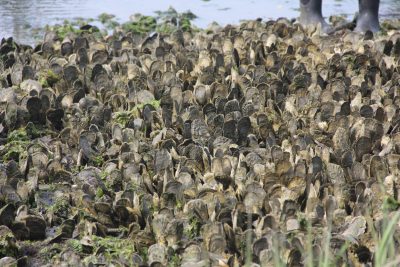
Connecticut Sea Grant has been awarded a $196,990 federal grant to lead a project designed to further the recovery of Connecticut’s shellfish industry from the effects of the COVID-19 pandemic and position it to be more resilient in the future.
The grant from the National Sea Grant program to Connecticut Sea Grant was one of 13 announced Aug. 30, 2021, for Sea Grant programs nationwide for two efforts to support sustainable growth in the U.S. seafood industry. One set of projects including Connecticut’s addresses COVID-19 impacts to seafood resources, while the other focuses on improving coordination for marine aquaculture development. A total of $3.5 million was awarded.
The Connecticut project, titled, “Resilience through Restoration: Developing a Sustainable Shellfish Bed Management Strategy to Support Connecticut’s Shellfish Sector,” will be led by CT Sea Grant with partners including the Connecticut Department of Agriculture Bureau of Aquaculture; the NOAA Northeast Fisheries Science Center; commercial and recreational shellfish industry representatives; UConn; nonprofit organizations; and members of the Connecticut Restaurant Association.
It will build on a project launched in the first weeks of the pandemic lockdown in 2020 that used federal emergency relief funds to employ commercial shellfish companies on a three-phase restoration project in the state’s natural clam and oyster beds. These beds are critical to the industry as a main source of affordable seed for local farms. The program was essential to sustaining the state’s shellfish industry through the worst of the pandemic, when restaurant closures led to a 93% decline in shellfish sales. In typical years, sales of Connecticut shellfish are valued at more than $30 million.
With the new funding, shellfish companies will have opportunties to work on additional restoration of the natural shellfish beds. Scientific assessments to evaluate the success of different types of projects will be done to inform long-term management strategies for these important resources. Connecticut has more than 3,500 acres of natural beds, located mainly in central and western Long Island Sound.
“We are very excited to continue this important work to restore shellfish habitats and populations,” said Tessa Getchis, CT Sea Grant aquaculture extension specialist who is leading the project. “It’s a real win-win that we have opportunity to realize both economic and environmental benefits.”
The restoration work will be complemented by a demonstration project to assess the feasiblity of establishing a shell recycling program. Oyster shells are key building blocks for natural beds but are in short supply. The project would support development of a shell management strategy that could be used at restaurants and other food-service businesses to reclaim shell and return it to the beds.
Together the restoration and shell recycling projects will strengthen the commercial shellfish industry to be more resilient in the future.
“Thanks to the established and new partnerships, I am glad we once again were able to find funding to engage aquaculture industry members for short- and long-term economic and environmental benefits,” said Sylvain De Guise, director of CT Sea Grant.
More information: Judy Benson, CT Sea Grant communications coordinator: judy.benson@uconn.edu; (860) 287-6426.